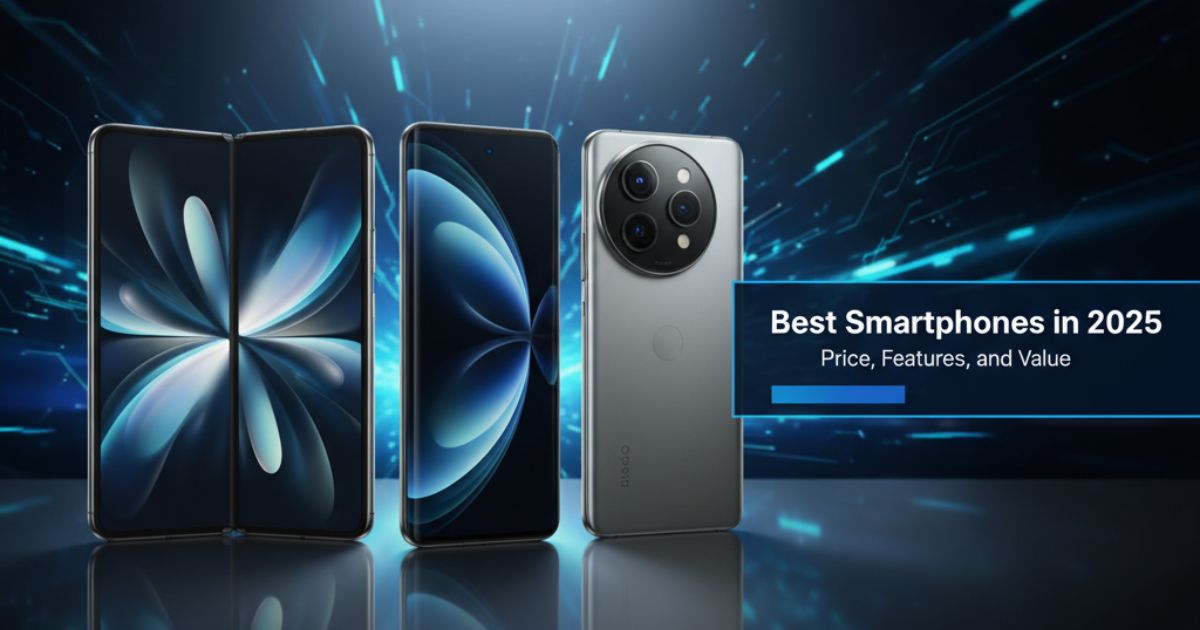Smartphones in 2025 are pushing boundaries in speed, camera, AI, and battery life. But with so many options, which ones give you the best value? In this guide, we’ll look at the best smartphones you can buy in 2025 — spanning flagship, mid-range, and “value champion” models. We’ll compare price vs features, help you decide based on your priorities, and point out trends shaping the smartphone landscape.
What to Look for in 2025 Smartphones
Before listing models, let’s set the parameters. To judge a smartphone as “best,” we’ll consider:
- Performance & chipsets: Next-gen SoCs, AI co-processors
- Display & refresh rate: AMOLED / OLED, 120 Hz, HDR
- Camera systems: Sensor size, zoom, stabilization, AI processing
- Battery & charging: Large capacity, fast / wireless / reverse charging
- Software & updates: How many OS versions, security patches
- Connectivity & extras: 5G, Wi-Fi 7, IP rating, stereo speakers
- Price-to-value ratio: Getting as much for your money
- Innovation / unique features: Foldables, modular design, repairability
These criteria help balance tech hype with real usability.
Top Smartphones to Consider in 2025
Here are some standout phones across different budgets and use cases. (Disclaimer: Product prices may vary based on region, availability, and local taxes.)

Samsung Galaxy S25 Ultra
₹1,35,499
•Samsung.com + others

Nothing Phone Pro
₹25,000
•Amazon.in + others

OnePlus Nord CE5
₹21,499
•OnePlus Official Store + others

Redmi Note 14 5G
₹16,499
•Reliance Digital

Vivo T4x 5G
₹14,499
•Croma + others
Below are several picks and what makes them noteworthy:
- Samsung Galaxy S25 Ultra 5G – a powerhouse flagship with top-tier camera, big battery, and full Samsung ecosystem support.
- Nothing Phone Pro 5G – a design-forward option with clean UI and interesting features.
- OnePlus Nord CE5 5G – a strong mid-range pick offering solid performance and balanced features.
- Redmi Note 14 5G – great value in the mid-range tier; strong specs for the price.
- Vivo T4x 5G – a budget option that still delivers good performance and modern features.
Let’s dive deeper into these and others.
Detailed Reviews & Strengths
Samsung Galaxy S25 Ultra
- Why it stands out: This is a true flagship for 2025. Expect high-end cameras, advanced AI imaging, top-class display, and long-term software support.
- Strengths: Versatility in zoom, robust ecosystem, premium build, top-tier specs.
- Value factor: Worth it if you want flagship every possible feature and longevity.
Nothing Phone Pro
- Why it stands out: Unique design, clean software, and good balance of performance + style.
- Strengths: Stylish look, efficient UI, respectable camera input.
- Tradeoffs: May lack some top-tier performance compared to absolute flagships.
OnePlus Nord CE5
- Why it stands out: Ideal upper-mid compromise — you get many flagship features at a more accessible price.
- Strengths: Fast charging, good performance, reliable software experience.
- Tradeoffs: Camera or materials might not match “Ultra” flagships.
Redmi Note 14 5G
- Why it stands out: Classic “value king” in the mid-range segment.
- Strengths: High specs for price, balanced features, good battery life.
- Tradeoffs: May miss premium extras like wireless charging or IP rating.
Vivo T4x 5G
- Why it stands out: Strong budget contender that doesn’t feel cheap.
- Strengths: Decent display, modern connectivity, acceptable performance.
- Tradeoffs: Build materials, camera performance, and software support may be scaled down.
Price Bands & What You Should Expect
To choose the best smartphone for your budget, here’s a rough breakdown of what features you should expect in different price tiers in 2025:
| Price Tier | Typical Price Range | What You Should Expect |
|---|---|---|
| Flagship / Premium | $900+ / ₹70,000+ | Top SoC, best cameras, wireless charging, long updates, advanced features |
| Upper Mid-Range | $400–900 / ₹25,000–70,000 | Strong performance, good cameras, 120Hz display |
| Mid-Range / Value | $200–400 / ₹10,000–25,000 | Balanced features, decent camera, reliable battery |
| Budget / Entry | Below $200 / ₹ <10,000 | Basic features, moderate performance, acceptable tradeoffs |
If you aim for “Best Smartphones in 2025”, the sweet spot for many will be upper-mid to mid-range — where you get 80-90% of flagship experience at a fraction of the cost.
What Innovations Are Shaping 2025 Phones
To appreciate how far smartphones have come — and where you should expect more — here are some emerging tech trends:
AI & On-Device Intelligence
Smartphones are integrating AI co-processors and more powerful neural engines. Tasks like image enhancement, voice recognition, predictive UI behaviors, and computational photography are happening locally.
Advanced Camera Systems
1-inch sensors, quad-lens systems, periscope zooms, and AI-based post-processing will continue. Huawei’s new Pura 80 series is pushing this frontier. Wikipedia
Modular & Repairable Design
Brands like Fairphone are focusing on modular phones — easy to repair, upgrade, or replace parts. The Fairphone 6 is an example in 2025. Wikipedia
Display Innovations
Foldables, rollables, and ultra-thin flexible displays are becoming more refined — e.g., Huawei Pura X foldable. Wikipedia
Battery & Charging
Graphene batteries, ultra-fast charging (200W+), longer battery cycles, and enhancements in energy efficiency are in the works. HowStuffWorks
Connectivity & Extras
Wi-Fi 7, 5G (mmWave in more regions), satellite fallback, better AR/VR integration, and smarter sensors (biometric, environmental) are becoming standard.
How to Choose the Best Smartphone for You In 2025
Not everyone needs a flagship. Here are some tips to help you choose the right features for your needs.:
- Identify your priority
- Gaming / performance → pick flagship or high-end upper mid-range
- Camera / content creation → emphasize optical system and AI imaging
- Battery & endurance → look for large battery + efficient chip
- Longevity → good software support (3–5 years) and modular repairability
- Balance tradeoffs
- Sometimes sacrificing wireless charging or ultra-high zoom is okay if it saves cost.
- Consider user experience: software optimization, UI, ecosystem.
- Future-proofing
- Choose models with support for upcoming networks (5G, Wi-Fi 7)
- Monitor update policies (OS + security patches)
- Local support matters
- In India, Europe, etc., check if parts and servicing are available
- Language & network compatibility
Regional / India-Specific Notes (If you write for India)
- Price sensitivity: Many buyers consider ₹20,000-₹40,000 as sweet mid-to-upper zone.
- Network bands: Ensure support for Indian 5G bands (n78, n28, etc.).
- Software updates: Brands promising 4–5 years of updates stand out in India.
- After-sales & repair: Xiaomi, Samsung, OnePlus have bigger service networks in India.
- Budget heroes: Indian / Chinese brands often deliver high spec at lower cost (Redmi, Realme, iQOO). For instance, iQOO Z10 launched in 2025: 7,300 mAh, Snapdragon 7s Gen 3. Wikipedia
Final Thoughts & Buying Strategy
In 2025, “best smartphone” no longer strictly means the most expensive. Real value lies in matching features to your needs while avoiding overpaying for extras you won’t use. Here’s your step-by-step:
- Fix your budget band
- Choose top 2–3 features you care most about
- Compare phones in that band with those features
- Check after-sales, software policy, and local support
- Watch for deals or sales (like festive discounts)
Read more AI-related posts – Follow us on Medium for the latest insights on technology, AI, robotics, and automation
Frequently Asked Questions
Q1: What is the best smartphone in 2025?
There’s no single best — it depends on your priorities (camera, performance, software, price). Brands like Samsung, Apple, Xiaomi, OnePlus, Nothing, and Huawei are all strong picks based on region and use case.
Q2: Should I wait for 2025 models?
If your current phone works fine, waiting is okay. But 2024 models on sale may now offer better value. Keep an eye on new launches at MWC or brand events.
Q3: Is flagship worth it over mid-range?
Flagships bring extra performance, camera, and features — but mid-range phones now often cover 80–90% of what a flagship does for far less.
Q4: How many years of software updates should I expect?
In 2025, 3–5 years of OS + security updates is considered good. Modular or repairable design adds to longevity.
Q5: Which features are must-haves in 2025?
At minimum: 5G, 120 Hz display, IP rating (water & dust), good primary camera, and fast charging.
Author: Bal Kishan
Writer of Zipaitech.com — a technology and SEO-focused platform helping readers stay ahead in the world of AI, gadgets, and digital innovation.
Bal Kishan specializes in AI-powered SEO, automation tools, and emerging tech trends. Through Zipaitech, he shares practical insights that blend technology, business, and real-world usability to help readers make smarter digital decisions.





3 thoughts on “Best Smartphones in 2025: Price, Features, and Value”